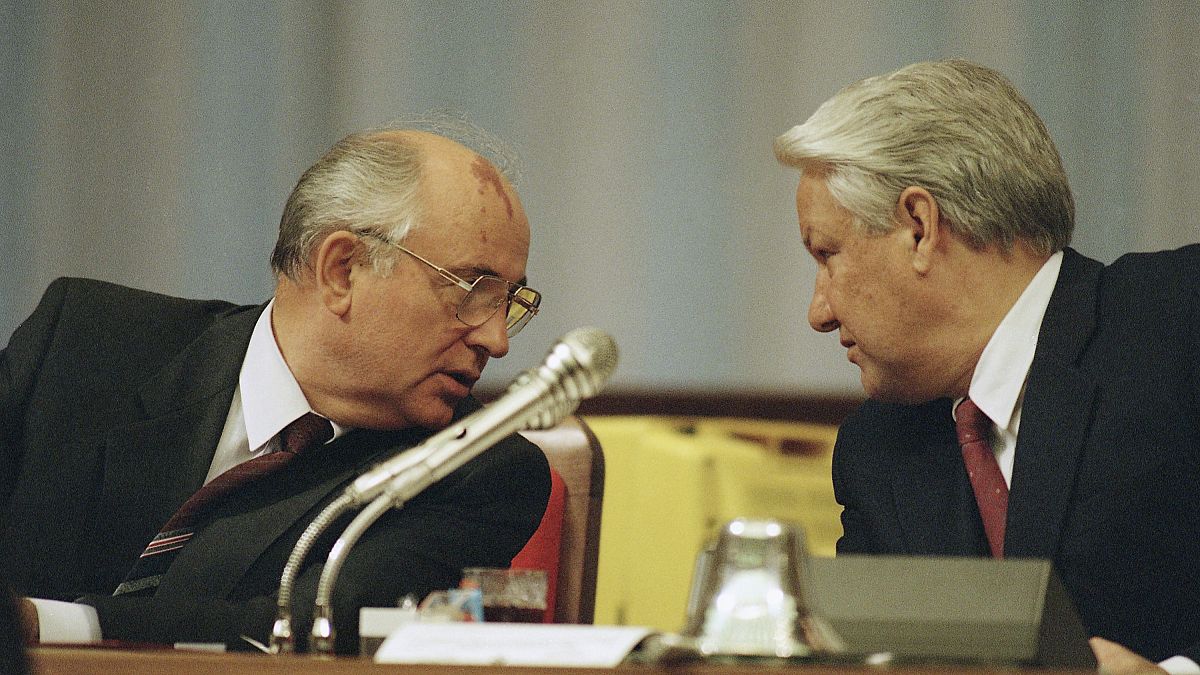The USSR was formally dissolved on 26 December 1991.
Thirty years ago, the Soviet Union dissolved as the result of internal political, economic, and ethnic disintegration within the USSR following General Secretary Mikhail Gorbachev's effort to reform the Soviet political and economic system.
In an attempt to end the 'Era of Stagnation', Gorbachev launched 'perestroika', a political movement for reformation within the Communist Party of the Soviet Union designed to boost the economy.
At first, the programme visibly revitalised the dwindling USSR in 1985, but the struggling superpower was still gripped by an arms race and years of mismanagement.
The unity of 15 Soviet Republics, what had made the force of the communist regime and was applauded by its propaganda, was quickly disintegrating, with the Caucasus region rebelling against Moscow first, joined shortly after by the Baltic countries.
In 1988, Estonia was the first Soviet republic to declare state sovereignty from Moscow.
In January 1991, Moscow intervened and fired on demonstrators, in an attempt to tame the insurrection.
However, the move failed and Lithuania became the first Republic to officially break away from the USSR, declaring its independence in the Act of March 11, 1990.
It was only on August 19, 1991, that the fatal blow to the USSR came, when the Soviets woke to the news that the eighth and final leader of the Soviet Union, Mikhail Gorbachev, was unable to govern for health reasons.
Following Gorbachev's announcement, tanks entered Moscow, public meetings were banned, and pro-reform newspapers were shut down.
The Committee on the State of Emergency was immediately created in the hopes to save the country from submerging into "chaos and anarchy", but its rule collapsed within two days, proving to be the catalyst to a long string of events that would soon end the Soviet Union.
Boris Yeltsin, the President of the Russian Federation within the USSR, emerged victorious, while Gorbachev returned weaker than ever.
Moscow's government struggled to retain its influence and many republics such as Ukraine and the Baltic states proclaimed their independence in the days and months that followed.
On December 8, 1991, in a move to recognise each other's independence, the leaders of three of the Union's founding and largest republics (the Russian SFSR, the Ukrainian SSR, and the Byelorussian SSR) declared that the Soviet Union no longer existed, and signed the Commonwealth of Independent States.
They were quickly followed by 11 more republics, and Gorbachev had to first retire as leader of the Communist Party since it practically ceased to work, then resign from his office as president, to formally acknowledge the Union's collapse as a "fait accompli".
On December 26, 1991 -- a day after President Gorbachev stepped down and the Soviet red flag was replaced with the Russian tricolour -- the USSR was formally dissolved.
When the end came it took only months for the USSR to unravel, but it still took the world, which had been indoctrinated by the binary logic of the Cold War, by surprise.
Now thirty years on and many of the former Soviet Republics remain wary of Russia, with tensions building up at the border between Ukraine and Russia in recent months, and Russian troops invading Ukraine in 2014 and annexing the Crimean Peninsular before that, as well as troops briefly invading Georgia in 2008.
Just as France and Britain, the two biggest former colonial powers in Africa, exerted a degree of control after they had left, Russia today continues to exert a greater or lesser influence, whether economic, political, or military on almost all of these young states.
